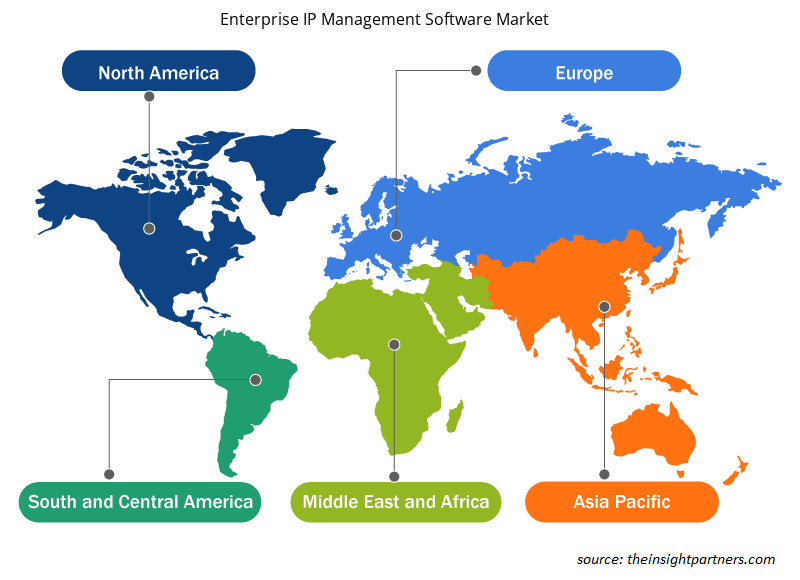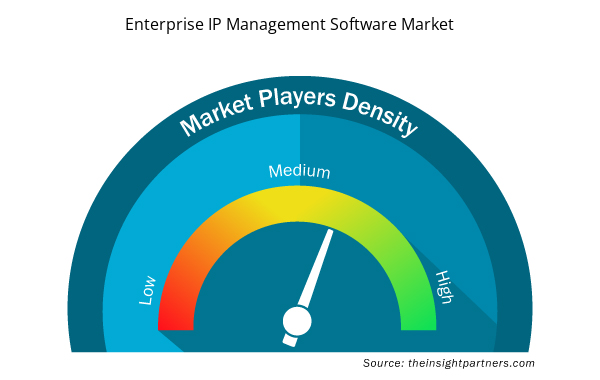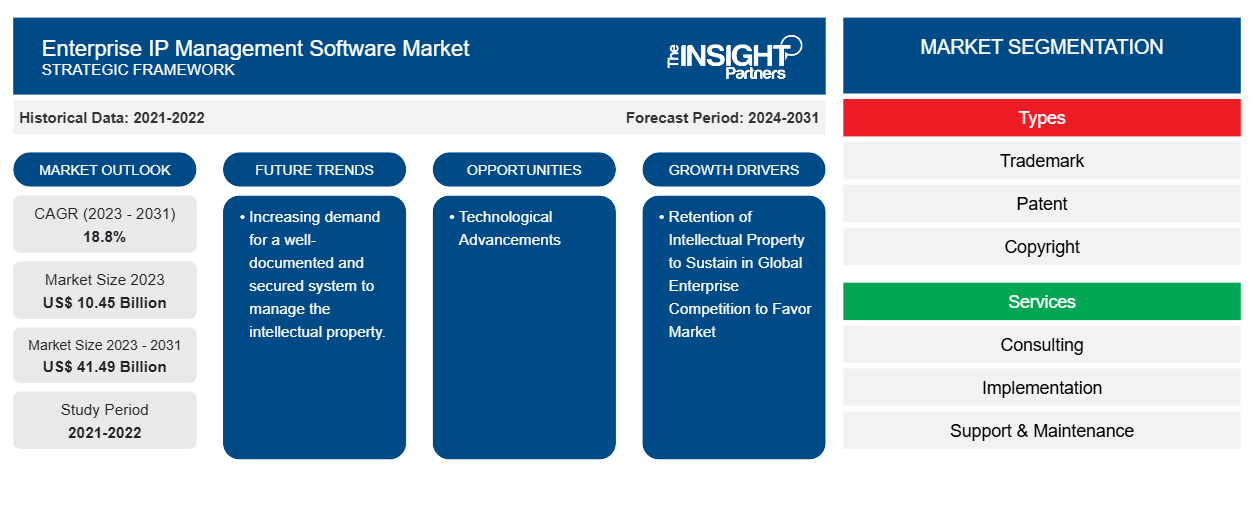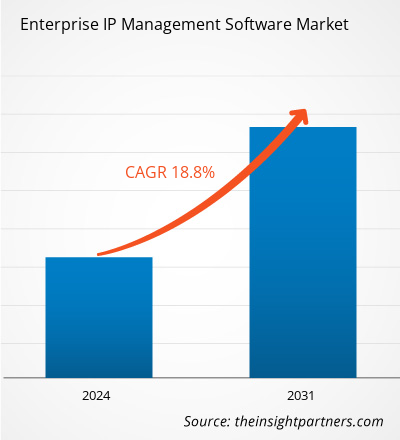من المتوقع أن يصل حجم سوق برامج إدارة الملكية الفكرية للمؤسسات إلى 41.49 مليار دولار أمريكي بحلول عام 2031 من 10.45 مليار دولار أمريكي في عام 2023. ومن المتوقع أن يسجل السوق معدل نمو سنوي مركب بنسبة 18.8٪ في الفترة 2023-2031.من المرجح أن يظل الاحتفاظ بالملكية الفكرية للاستمرار في المنافسة العالمية للشركات والعدد المتزايد من قنوات التسليم الجديدة من الاتجاهات الرئيسية لسوق برمجيات إدارة الملكية الفكرية للشركات.
تحليل سوق برامج إدارة الملكية الفكرية للمؤسسات
لقد شهد سوق برامج إدارة الملكية الفكرية نموًا كبيرًا وتم تبنيها بمعدل كبير في السنوات القليلة الماضية، ومن المتوقع أن تستمر هذه الاتجاهات في السنوات القادمة. تعتمد البلدان النامية في عصر العولمة على الملكية الفكرية لتحقيق تقدمها الاقتصادي. بدأت الاقتصادات النامية في منطقة آسيا والمحيط الهادئ تدرك قيمة الملكية الفكرية وضرورتها وكيف تؤثر على التجارة والاستثمار. وعلى الرغم من الفوائد العديدة التي تقدمها العلاقات الدولية، فإن معظم دول منطقة آسيا والمحيط الهادئ تفتقر إلى الإجراءات اللازمة لإصدار وإنفاذ حقوق الملكية الفكرية، مما يتسبب في خسائر كبيرة للشركات.
نظرة عامة على سوق برامج إدارة الملكية الفكرية للمؤسسات
تستخدم الشركات التي تمتلك علامات تجارية وبراءات اختراع أو تأمل في الحصول عليها برامج إدارة الملكية الفكرية. كما تساعد برامج إدارة الملكية الفكرية المحامين وشركات المحاماة المتخصصة في الملكية الفكرية في التخطيط وتنفيذ نتائج ملفات الملكية الفكرية والتقاضي.
قم بتخصيص هذا التقرير ليناسب متطلباتك
ستحصل على تخصيص لأي تقرير - مجانًا - بما في ذلك أجزاء من هذا التقرير، أو تحليل على مستوى الدولة، وحزمة بيانات Excel، بالإضافة إلى الاستفادة من العروض والخصومات الرائعة للشركات الناشئة والجامعات
- احصل على أهم اتجاهات السوق الرئيسية لهذا التقرير.ستتضمن هذه العينة المجانية تحليلاً للبيانات، بدءًا من اتجاهات السوق وحتى التقديرات والتوقعات.
محركات وفرص سوق برامج إدارة الملكية الفكرية للمؤسسات
الاحتفاظ بالملكية الفكرية من أجل الاستمرار في المنافسة العالمية بين الشركات لصالح السوق
إن أصول الملكية الفكرية تشكل أدوات مهمة وقابلة للتكيف لتعزيز المنافسة بين الشركات والحفاظ عليها. والأمر الأكثر أهمية الذي فعلته العولمة وتحرير التجارة هو جعل جميع الشركات، حتى الشركات الصغيرة والمتوسطة الحجم، قادرة على المنافسة على نطاق عالمي، حتى لو كانت تعمل في السوق المحلية لبلد واحد. وتحتاج الشركات الصغيرة والمتوسطة الحجم إلى خطة عمل واضحة من أجل الحفاظ على قدرتها التنافسية. ويتعين عليها زيادة الإنتاجية باستمرار، وخفض تكاليف الإنتاج، وتحسين سمعة خطوط منتجاتها من خلال مجموعة متنوعة من الوسائل، مثل الاستثمار في البحث والتطوير، واكتساب التكنولوجيا الجديدة، وخلق تصاميم أفضل، والتسويق الناجح لسلعها.
التقدم التكنولوجي
إن التطورات التكنولوجية قادرة على قلب الأسواق القائمة لبرامج إدارة الملكية الفكرية للشركات رأساً على عقب، وفتح آفاق جديدة للأعمال، وتغيير سلوك العملاء. ويتعين على الشركات أن تواكب التطورات التكنولوجية إذا كانت تريد أن تظل قادرة على المنافسة.
تقرير تحليل تجزئة سوق برامج إدارة الملكية الفكرية للمؤسسات
إن القطاعات الرئيسية التي ساهمت في اشتقاق تحليل سوق برامج إدارة الملكية الفكرية للمؤسسات هي الأنواع والخدمات والمستخدم النهائي.
- وفقًا للنوع، ينقسم سوق برامج إدارة الملكية الفكرية للمؤسسات إلى العلامات التجارية وبراءات الاختراع وحقوق النشر والتصميم والتقاضي. ومن المتوقع أن ينمو قطاع العلامات التجارية خلال فترة التنبؤ.
- من حيث الخدمات، يتم تقسيم السوق إلى الاستشارات والتنفيذ والدعم والصيانة. ومن المتوقع أن ينمو قطاع الاستشارات خلال الفترة المتوقعة.
- بناءً على المستخدم النهائي، ينقسم سوق برامج إدارة الملكية الفكرية للمؤسسات إلى BFSI، والأدوية، والسيارات، والفضاء والدفاع، وتكنولوجيا المعلومات ومعاهد البحث. ومن المتوقع أن ينمو قطاع BFSI في الفترة المتوقعة.
تحليل حصة سوق برامج إدارة الملكية الفكرية للمؤسسات حسب المنطقة الجغرافية
ينقسم النطاق الجغرافي لتقرير سوق برامج إدارة الملكية الفكرية للمؤسسات بشكل أساسي إلى خمس مناطق: أمريكا الشمالية، ومنطقة آسيا والمحيط الهادئ، وأوروبا، والشرق الأوسط وأفريقيا، وأمريكا الجنوبية/أمريكا الجنوبية والوسطى. سيطرت أمريكا الشمالية على سوق برامج إدارة الملكية الفكرية للمؤسسات. وقد أدت اتجاهات تبني التكنولوجيا العالية في مختلف الصناعات في منطقة أمريكا الشمالية إلى تغذية نمو سوق برامج إدارة الملكية الفكرية للمؤسسات. ومن المتوقع أن تؤدي عوامل مثل زيادة تبني الأدوات الرقمية والإنفاق التكنولوجي العالي من قبل الوكالات الحكومية إلى دفع نمو سوق برامج إدارة الملكية الفكرية للمؤسسات في أمريكا الشمالية. وعلاوة على ذلك، فإن التركيز القوي على البحث والتطوير في الاقتصادات المتقدمة في الولايات المتحدة وكندا يجبر اللاعبين في أمريكا الشمالية على جلب حلول متقدمة تقنيًا إلى السوق. بالإضافة إلى ذلك، يوجد في الولايات المتحدة العديد من اللاعبين في سوق برامج إدارة الملكية الفكرية للمؤسسات الذين يركزون بشكل متزايد على تطوير حلول مبتكرة. تساهم كل هذه العوامل في نمو سوق برامج إدارة الملكية الفكرية للمؤسسات في المنطقة.
رؤى إقليمية حول سوق برامج إدارة الملكية الفكرية للمؤسسات
لقد قام المحللون في Insight Partners بشرح الاتجاهات والعوامل الإقليمية المؤثرة على سوق برمجيات إدارة الملكية الفكرية للمؤسسات طوال فترة التوقعات بشكل شامل. يناقش هذا القسم أيضًا قطاعات سوق برمجيات إدارة الملكية الفكرية للمؤسسات والجغرافيا في جميع أنحاء أمريكا الشمالية وأوروبا ومنطقة آسيا والمحيط الهادئ والشرق الأوسط وأفريقيا وأمريكا الجنوبية والوسطى.

- احصل على البيانات الإقليمية المحددة لسوق برامج إدارة الملكية الفكرية للمؤسسات
نطاق تقرير سوق برامج إدارة الملكية الفكرية للمؤسسات
| سمة التقرير | تفاصيل |
|---|---|
| حجم السوق في عام 2023 | 10.45 مليار دولار أمريكي |
| حجم السوق بحلول عام 2031 | 41.49 مليار دولار أمريكي |
| معدل النمو السنوي المركب العالمي (2023 - 2031) | 18.8% |
| البيانات التاريخية | 2021-2022 |
| فترة التنبؤ | 2024-2031 |
| القطاعات المغطاة | حسب الأنواع
|
| المناطق والدول المغطاة | أمريكا الشمالية
|
| قادة السوق وملفات تعريف الشركات الرئيسية |
|
كثافة اللاعبين في سوق برامج إدارة الملكية الفكرية للمؤسسات: فهم تأثيرها على ديناميكيات الأعمال
يشهد سوق برامج إدارة الملكية الفكرية للمؤسسات نموًا سريعًا، مدفوعًا بالطلب المتزايد من المستخدم النهائي بسبب عوامل مثل تفضيلات المستهلكين المتطورة والتقدم التكنولوجي والوعي المتزايد بفوائد المنتج. ومع ارتفاع الطلب، تعمل الشركات على توسيع عروضها والابتكار لتلبية احتياجات المستهلكين والاستفادة من الاتجاهات الناشئة، مما يؤدي إلى زيادة نمو السوق.
تشير كثافة اللاعبين في السوق إلى توزيع الشركات أو المؤسسات العاملة في سوق أو صناعة معينة. وهي تشير إلى عدد المنافسين (اللاعبين في السوق) الموجودين في مساحة سوق معينة نسبة إلى حجمها أو قيمتها السوقية الإجمالية.
الشركات الرئيسية العاملة في سوق برمجيات إدارة الملكية الفكرية للمؤسسات هي:
- شركة أناكوا
- كلاريفيت
- ويب تي إم إس
- الكاردينال للملكية الفكرية المحدودة
- شركة باتريكس ايه بي
- فليكستارك
إخلاء المسؤولية : الشركات المذكورة أعلاه ليست مرتبة بأي ترتيب معين.

- احصل على نظرة عامة على أهم اللاعبين الرئيسيين في سوق برامج إدارة الملكية الفكرية للمؤسسات
أخبار سوق برامج إدارة الملكية الفكرية للمؤسسات والتطورات الأخيرة
يتم تقييم سوق برامج إدارة الملكية الفكرية للمؤسسات من خلال جمع البيانات النوعية والكمية بعد البحث الأولي والثانوي، والتي تتضمن منشورات الشركات المهمة وبيانات الجمعيات وقواعد البيانات. فيما يلي قائمة بالتطورات في السوق:
- في فبراير 2023، أعلنت شركة Resurgens Technology Partners، وهي شركة استثمارية خاصة تركز على البرمجيات، أن شركتها التابعة Wellspring، المزود الرائد لبرمجيات إدارة الابتكار والملكية الفكرية، قد أكملت الاستحواذ على IP Pragmatics، وهي شركة استشارية وخدمات رائدة لنقل التكنولوجيا وإدارة الملكية الفكرية.
(المصدر: Resurgens Technology Partners، بيان صحفي، 2023)
- في أبريل 2022، أعلنت شركة Anaqua، المزود الرائد لتكنولوجيا إدارة الابتكار والملكية الفكرية، عن خططها لإطلاق حل الإفصاح الآلي الجديد للمعلومات كجزء من عرض إدارة الملكية الفكرية AQX للشركات ومكاتب المحاماة. سيساعد النظام الجديد متخصصي الملكية الفكرية على توفير الوقت والمال من خلال تبسيط عملية الإفصاح الآلي وأتمتتها.
(المصدر: Anaqua، بيان صحفي، 2022)
تقرير سوق برامج إدارة الملكية الفكرية للمؤسسات يغطي المنتجات المطلوبة
يوفر تقرير "حجم سوق برامج إدارة الملكية الفكرية للمؤسسات والتوقعات (2021-2031)" تحليلاً مفصلاً للسوق يغطي المجالات التالية:
- حجم السوق والتوقعات على المستويات العالمية والإقليمية والوطنية لجميع قطاعات السوق الرئيسية التي يغطيها النطاق
- ديناميكيات السوق مثل المحركات والقيود والفرص الرئيسية
- الاتجاهات المستقبلية الرئيسية
- تحليل مفصل لقوى PEST/Porter الخمس وSWOT
- تحليل السوق العالمي والإقليمي الذي يغطي اتجاهات السوق الرئيسية واللاعبين الرئيسيين واللوائح والتطورات الأخيرة في السوق
- تحليل المشهد الصناعي والمنافسة الذي يغطي تركيز السوق، وتحليل خريطة الحرارة، واللاعبين البارزين، والتطورات الأخيرة
- ملفات تعريف الشركة التفصيلية
- التحليل التاريخي (سنتان)، السنة الأساسية، التوقعات (7 سنوات) مع معدل النمو السنوي المركب
- تحليل PEST و SWOT
- حجم السوق والقيمة / الحجم - عالميًا وإقليميًا وقطريًا
- الصناعة والمنافسة
- مجموعة بيانات Excel



Report Coverage
Revenue forecast, Company Analysis, Industry landscape, Growth factors, and Trends

Segment Covered
This text is related
to segments covered.

Regional Scope
North America, Europe, Asia Pacific, Middle East & Africa, South & Central America

Country Scope
This text is related
to country scope.
الأسئلة الشائعة
The global enterprise IP management software market is expected to reach US$ 41.49 billion by 2031.
The key players holding majority shares in the global enterprise IP management software market are Anaqua, Inc., Clarivate, WebTMS, Cardinal Intellectual Property, Inc., Patrix AB, Flextarc, and Patracode Services Pvt. Ltd, SimpleLegal, Inc., Decision Design Corporation, AppColl.
Technological Advancements are impacting the enterprise IP management software, which is anticipated to play a significant role in the global enterprise IP management software market in the coming years.
Retention of intellectual property to sustain in global enterprise competition and the rising number of new channels of delivery are the major factors that propel the global enterprise IP management software market growth.
The global enterprise IP management software market was estimated to be US$ 10.45 billion in 2023 and is expected to grow at a CAGR of 18.8% during the forecast period 2024 - 2031.
Trends and growth analysis reports related to Technology, Media and Telecommunications : READ MORE..
The Insight Partners performs research in 4 major stages: Data Collection & Secondary Research, Primary Research, Data Analysis and Data Triangulation & Final Review.
- Data Collection and Secondary Research:
As a market research and consulting firm operating from a decade, we have published and advised several client across the globe. First step for any study will start with an assessment of currently available data and insights from existing reports. Further, historical and current market information is collected from Investor Presentations, Annual Reports, SEC Filings, etc., and other information related to company’s performance and market positioning are gathered from Paid Databases (Factiva, Hoovers, and Reuters) and various other publications available in public domain.
Several associations trade associates, technical forums, institutes, societies and organization are accessed to gain technical as well as market related insights through their publications such as research papers, blogs and press releases related to the studies are referred to get cues about the market. Further, white papers, journals, magazines, and other news articles published in last 3 years are scrutinized and analyzed to understand the current market trends.
- Primary Research:
The primarily interview analysis comprise of data obtained from industry participants interview and answers to survey questions gathered by in-house primary team.
For primary research, interviews are conducted with industry experts/CEOs/Marketing Managers/VPs/Subject Matter Experts from both demand and supply side to get a 360-degree view of the market. The primary team conducts several interviews based on the complexity of the markets to understand the various market trends and dynamics which makes research more credible and precise.
A typical research interview fulfils the following functions:
- Provides first-hand information on the market size, market trends, growth trends, competitive landscape, and outlook
- Validates and strengthens in-house secondary research findings
- Develops the analysis team’s expertise and market understanding
Primary research involves email interactions and telephone interviews for each market, category, segment, and sub-segment across geographies. The participants who typically take part in such a process include, but are not limited to:
- Industry participants: VPs, business development managers, market intelligence managers and national sales managers
- Outside experts: Valuation experts, research analysts and key opinion leaders specializing in the electronics and semiconductor industry.
Below is the breakup of our primary respondents by company, designation, and region:

Once we receive the confirmation from primary research sources or primary respondents, we finalize the base year market estimation and forecast the data as per the macroeconomic and microeconomic factors assessed during data collection.
- Data Analysis:
Once data is validated through both secondary as well as primary respondents, we finalize the market estimations by hypothesis formulation and factor analysis at regional and country level.
- Macro-Economic Factor Analysis:
We analyse macroeconomic indicators such the gross domestic product (GDP), increase in the demand for goods and services across industries, technological advancement, regional economic growth, governmental policies, the influence of COVID-19, PEST analysis, and other aspects. This analysis aids in setting benchmarks for various nations/regions and approximating market splits. Additionally, the general trend of the aforementioned components aid in determining the market's development possibilities.
- Country Level Data:
Various factors that are especially aligned to the country are taken into account to determine the market size for a certain area and country, including the presence of vendors, such as headquarters and offices, the country's GDP, demand patterns, and industry growth. To comprehend the market dynamics for the nation, a number of growth variables, inhibitors, application areas, and current market trends are researched. The aforementioned elements aid in determining the country's overall market's growth potential.
- Company Profile:
The “Table of Contents” is formulated by listing and analyzing more than 25 - 30 companies operating in the market ecosystem across geographies. However, we profile only 10 companies as a standard practice in our syndicate reports. These 10 companies comprise leading, emerging, and regional players. Nonetheless, our analysis is not restricted to the 10 listed companies, we also analyze other companies present in the market to develop a holistic view and understand the prevailing trends. The “Company Profiles” section in the report covers key facts, business description, products & services, financial information, SWOT analysis, and key developments. The financial information presented is extracted from the annual reports and official documents of the publicly listed companies. Upon collecting the information for the sections of respective companies, we verify them via various primary sources and then compile the data in respective company profiles. The company level information helps us in deriving the base number as well as in forecasting the market size.
- Developing Base Number:
Aggregation of sales statistics (2020-2022) and macro-economic factor, and other secondary and primary research insights are utilized to arrive at base number and related market shares for 2022. The data gaps are identified in this step and relevant market data is analyzed, collected from paid primary interviews or databases. On finalizing the base year market size, forecasts are developed on the basis of macro-economic, industry and market growth factors and company level analysis.
- Data Triangulation and Final Review:
The market findings and base year market size calculations are validated from supply as well as demand side. Demand side validations are based on macro-economic factor analysis and benchmarks for respective regions and countries. In case of supply side validations, revenues of major companies are estimated (in case not available) based on industry benchmark, approximate number of employees, product portfolio, and primary interviews revenues are gathered. Further revenue from target product/service segment is assessed to avoid overshooting of market statistics. In case of heavy deviations between supply and demand side values, all thes steps are repeated to achieve synchronization.
We follow an iterative model, wherein we share our research findings with Subject Matter Experts (SME’s) and Key Opinion Leaders (KOLs) until consensus view of the market is not formulated – this model negates any drastic deviation in the opinions of experts. Only validated and universally acceptable research findings are quoted in our reports.
We have important check points that we use to validate our research findings – which we call – data triangulation, where we validate the information, we generate from secondary sources with primary interviews and then we re-validate with our internal data bases and Subject matter experts. This comprehensive model enables us to deliver high quality, reliable data in shortest possible time.


 احصل على عينة مجانية لهذا التقرير
احصل على عينة مجانية لهذا التقرير